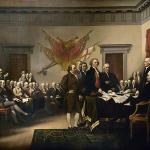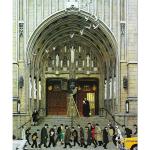I continue to be amazed by the positions to which anti-Trumpism leads. Now it seems we want pastors and priests to instruct the laity about politics. At least Lydia Bean does:
But it was surprising that Trump did even better with white evangelicals than George W. Bush, John McCain and Mitt Romney — three candidates who were better aligned with evangelical moral beliefs. In past elections, conservative evangelical leaders praised these people as “godly men” whose moral character was superior to that of their Democratic rivals. Bush spoke passionately about his Methodist faith, McCain called himself a regularly attending Baptist, and Romney was an active member of the Church of Jesus Christ of Latter-day Saints. By contrast, Trump was a seemingly irreligious man who said he had no sins that needed God’s forgiveness, though he had flaunted his extramarital affairs, divorced twice and appeared in a pornographic film . Trump violated every standard of evangelical moral character: He boasted about sexual assault, swore at campaign events, scapegoated refugees and immigrants, and mocked the disabled.
Trump’s vulgarity did not hurt him with white Catholics, either. While the candidate did not significantly outperform Romney among white Catholics, he also didn’t lose support, which was surprising, since Pope Francis had declared that “a person who thinks only about building walls, wherever they may be, and not building bridges, is not Christian.” (Trump hit back by calling the pope “disgraceful” and stating that no religious leader had the right to judge his faith.)
The reason Trump did so well with both groups is that laypeople were not looking to theologically trained religious elites to tell them how to vote. For many white evangelical and Catholic parishioners, their partisan map of “us vs. them” had already reshaped their religious identity. They struggled to make sense of a candidate like Trump, who swore fealty to their party while flouting the values of their creed. When the pope or their pastor clashed with their party’s nominee, they looked to partisan sources to justify their political biases in faith-based language — to tell them that their party was right and the pope was wrong.
As it turns out, Protestant and Roman Catholic leadership were far more critical of Trump than the laity since they evaluated the candidate on matters of personal character.
That leads Bean to this point:
It appears, then, that few white evangelicals evaluated Trump through the lens of their faith and decided that he was the lesser of two evils. Instead, most voted for him because they agreed with his economic nationalism and his pledge to “make America great again” by excluding Muslims and Hispanic immigrants. They did not experience the same crisis of conscience as Christian right elites such as Albert Mohler, a leading conservative voice in the Southern Baptist Convention who publicly refused to vote for Trump. This reflects the weak moral authority of evangelical leaders to shape the political preferences of their rank and file. Most evangelicals look to partisan sources and their social networks to tell them how to vote as a Christian. They don’t look to religious authorities to help them deliberate about politics through the eyes of faith.
Is evaluating the morality of a candidate really looking at politics through the eyes of faith? Not that many Americans have trouble with seeing the viciousness of Harvey Weinstein or Kevin Spacey these days. Does that mean the United States has experienced a revival of true religion? Or is it that most people have a basic moral sense? I think the latter is the case, and that does raise questions about why evangelicals would support someone as obviously creepy as Trump. (It wouldn’t have anything to do, would it, with how implicitly creep Clinton is.)
Another question is whether pastors and priests really have a responsibility to teach about politics. Whether Bean sees it or not, her argument contradicts the separation of church and state. In fact, Americans United for Separation of Church and State have been criticizing Republicans for trying to undermine the Johnson Amendment:
Americans United for Separation of Church and State today criticized Republicans in the House of Representatives for their continuing efforts to undermine the Johnson Amendment, a provision in federal law that prohibits tax-exempt nonprofit organizations from intervening in elections by endorsing or opposing candidates for public office.
Last week, the GOP leadership unveiled a tax bill that contained a provision that allows houses of worship, but not other nonprofits, to endorse or oppose candidates. Today, a House committee voted to vastly expand that language to include secular nonprofits and foundations as well.
“The House Republican leadership simply doesn’t get it,” said Maggie Garrett, legislative director for Americans United. “Their efforts to ‘fix’ a non-existent problem are only making things worse. They want to turn tax-exempt organizations into political campaign tools, which will threaten the integrity of our nonprofits and houses of worship, as well as our elections.”
That’s all fine and good. But if the churches could lead the resistance against Trump, then wouldn’t overturning the Johnson Amendment be a good thing? Bean’s answer appears to be “yes.”












